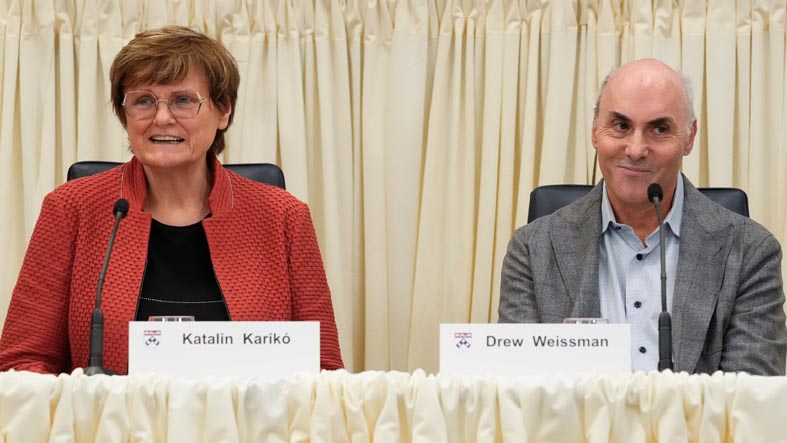Nitika Sharma, Jyoti Vakhlu
This year’s Nobel Prize in Physiology and Medicine has been awarded to the biochemist Katalin Kariko and Drew Weissman for their study published in 2005, which resulted in the development of mRNA vaccines during the COVID-19 pandemic.
The fundamental principle behind vaccines is to introduce a non-lethal form of a pathogen into the human body to stimulate the natural immune response, preparing the body to defend itself in case of an actual infection with the pathogen. Traditional vaccines were often composed of the entire inactivated or attenuated organism, as in the case of polio and the rabies vaccines. With the emergence of recombinant DNA technology, vaccines consisting of only non-lethal portions of the pathogen became more prevalent.
A type of vaccine known as “vector vaccines” uses non-pathogenic viruses to carry and distribute non-lethal parts of the pathogen throughout the human body. Since the invention of the subunit vaccines, mRNA was considered as a potential candidate for vaccine development. However, there were limitations associated with these vaccines, most notably the substantial production costs and time required, primarily due to the need for animal cell culture. This approach aimed to mitigate the inflammatory reactions caused by lab-made subunit vaccines. Furthermore, vector vaccines could trigger immunity against the carrier viruses, potentially rendering booster shots less effective.
A discussion near watercooler in University in Pennsylvania and discussing vaccine-related issues, particularly mRNA-based vaccines, Kariko and Weissman embarked on this fruitful collaboration. They observed that the immune system recognized laboratory-developed mRNA molecules as foreign substances, as expected, leading to an inflammatory response in the body. In contrast, mRNA derived from animal cell cultures did not trigger an inflammatory response but did generate immunity. A comparison of the two types of mRNA-laboratory-developed and cell line-developed-revealed frequent modifications in the cell line-derived mRNA. This prompted Kariko and Weissman to investigate the body’s response to laboratory-developed mRNA produced with the same DNA sequence but incorporating chemical alterations, such as using base analogues. To their pleasant surprise, the modified mRNA variants not only eliminated the inflammatory response but also resulted in the production of more proteins, enhancing immunity. This breakthrough eliminated significant obstacles in the clinical application of mRNA vaccines.
COVID -19 saw fastest ever development of vaccines and mostly two types of vaccines were developed. One was vector based i.e Covishield, that uses non-lethal part of virus glued to an adenovirus and another was mRNA based that was initially marketed by Pfizer and Moderna. mRNA based vaccines were approved for human vaccination for the first time during covid and the risk did pay. Additionally, since further generation of the variant mRNA is easy in comparison to the non-lethal part used, therefore development of the vaccine quickly against various variants is also easy.
Since nucleic acid-based vaccines are easy to manufacture and sequences, as well as bases can be easily modified, to be used against different pathogens therefore, not only can this technology be used gainst large number of pathogens but also other disease such as cancer. This technology is believed to have a significant impact on vaccine development and therapeutics. Therefore, it would not be out of the plce to say that, mRNA research hold key to the future of medicine. Katalin continued working on mRNA bsed vaccines when it was trashed by most of the leading scientist despite the pay cut, demotion and without major research fund. This only confirmed her conviction in the work that she was pursuing. Thomas Perlmann, Secretary General of the Nobel committee remarked that Katalin was “a women and a foreigner’ (as a Hungarian immegrant in US) pursuing an unpopular area of research without any support in a leading US University. Undeterred, she stayed true to her conviction. It is that triumph over adversity that we must celebrate.
Trending Now
E-Paper


